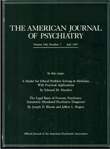TO THE EDITOR: Mortimer Ostow is incensed that I have reviewed his book on mysticism. He challenges my qualifications, evidently preferring that someone in his immediate circle should have been assigned the task. However, it is rather bootless to preach to the converted, and scholarly discourse should welcome a diversity of perspectives. As a steady contributor to the literature on the mystical experience and related emotional feeling states (
1–
5), I find it appropriate that I would review a book on this subject for the broad spectrum of readers of
The American Journal of Psychiatry.The capacity for the mystical experience has important evolutionary and psychodynamic implications. Most readers of this journal are going to want to know if a book about this subject is practical, relevant, and sufficiently comprehensive to be helpful in the practice of psychiatry. From my review, the reader will have no misunderstanding of what this book is about. Very few readers will feel a need to know about the more parochial and esoteric aspects of this subject. A basic fault with Ostow's book is expressed, paradoxically enough, in the sentence he cites, the last sentence of his book. The sentence begins, “Many of us who cannot accept the non-rational assumptions necessary to embrace mysticism” and ends with a little sop for the benighted ones, the “millions” who, through the centuries, have, by implication, abandoned rationality in their search for progressive solace. Such a perspective, i.e., that mysticism is “non-rational,” precludes alternative psychoanalytic explanations. Thus, the idea that mysticism is an example of experience in the progressive transitional mode (
1–
3) is not even considered by Ostow and his colleagues.
Ostow essentially reiterates orthodox Freudian reductionism: Hate is older than love; the solace of religion is always and only mere illusion; and the positive emotional feelings are simply defensive add-ons in the face of a “harsh and intransigent reality” (80). This obsolete perspective ignores the universality of the mystical phenomenon and reduces it to an exclusionary, paranoid, grandiose, and destructive “apocalyptic complex.”
Ostow faults me for not highlighting “affect regulation” as the “chief psychoanalytic parameter.” However, the “affect regulation” of the orthodox psychoanalytic paradigm, like Ostow's “apocalyptic complex,” is about regulating intensely negative and primitive affects. For Ostow, one can embrace, if he thinks they can be embraced at all, higher, more creative, and evolutionarily modern feeling states only by making “non-rational” assumptions.
Indeed, one wonders if Ostow and his colleagues are talking about mysticism at all. A sign of this is his focus on the “practice” of mysticism. One does not practice mysticism any more than one practices moments of musical genius, scientific inspiration, or, in the case of the apocalyptic complex, madness.
Ostow asks why I—or anyone—would look for maggidim in psychoanalytic institutes. My comment was in response to his statement, “The analyst plays the role of the apocalyptic seer who provides the revelation” (p. 138). One of the unexamined assumptions of such a posture is that the analyst can preempt the role of the maggid. The second is that the analyst, as surrogate maggid, can “practice” the delivery of revelations. This would be like a conservatory student practicing being Beethoven. Yet, the analyst might more appropriately look to the maggid for creative illumination for those whose backs are to the mouth of the cave.
Regarding Ostow's statement that I “misrepresent and misquote the text” about the time of the origin of Jewish mysticism, I found Ostow's discussion on pages 39–40 to be too ambiguous as a frame of reference for the reader. I therefore turned to noted historian Frederick Copleston (
6), who dates the
Cabala from “after the middle of the ninth century A.D.” to the “beginning of the thirteenth century” (p. 201). Other historians date the roots of the
Cabala a little earlier, at the beginning of the Middle Ages, but this may be of marginal significance for other than the professional historian.

